 This July 10, 2020 file photo shows vaccines in prefilled, single-use syringes following the inspection phase at the French pharmaceutical company Sanofi's world distribution center in Val de Reuil , France. (JOEL SAGET / AFP)
This July 10, 2020 file photo shows vaccines in prefilled, single-use syringes following the inspection phase at the French pharmaceutical company Sanofi's world distribution center in Val de Reuil , France. (JOEL SAGET / AFP)
SAN JOSE / TUNIS / ROME / MEXICO CITY / BRASILIA / PARIS / LONDON / WINDHOEK / ABUJA / PRAGUE / BUDAPEST / MOSCOW / BRUSSELS - The US will top 200,000 deaths from the novel coronavirus in coming days, a devastating milestone that comes eight months after the pathogen was first confirmed on American soil.
The US has so far reported more than 6.6 million confirmed COVID-19 cases and more than 197,000 deaths, according to a tally by Johns Hopkins University.
The US, with 4% of the world’s population, accounts for about 21% of global coronavirus deaths. The disparity underscores America’s failure to contain a virus that blazed through populous states like Texas, Florida and California this summer despite predictions that warmer weather could bring a respite.
With a population of 330 million, the US reached 100,000 COVID-19 deaths on May 27, four months after the first recorded case. It has taken another four months to reach 197,633 as of Thursday evening, according to Johns Hopkins University. That’s a number roughly equal to the population of Yonkers, New York, or Huntsville, Alabama. Brazil ranks second in deaths, with almost 135,000 in a nation of 210 million.
US manufacturers are sharply increasing production of cheap, fast - but less accurate - COVID-19 tests, aiming for 100 million per month by year end that will enable schools and workplaces to significantly expand testing.
With only four days' notice, New York City Mayor Bill de Blasio delayed the start of in-person learning at public schools for a second time for most students on Thursday as the city grapples to safely reopen during the coronavirus pandemic.
In-person learning had previously been delayed from Sept 10 to Sept 21, for those students who opted in. Now, only pre-kindergarten children and students with special learning needs will start Sept 21, the mayor said at a news conference. Elementary school students will begin on Sept 29. Middle school and high school students will start Oct 1.
READ MORE: NY lockdown cut spread by 70 percent, study finds
Meanwhile, Republican Senator Ron Johnson, who was due to join President Donald Trump in Wisconsin on Thursday, has instead entered quarantine after being exposed to someone who tested positive for the coronavirus, his office said in a statement.
Johnson, 65, who chairs the Senate Homeland Security Committee, has tested negative for COVID-19 and is experiencing no symptoms but will remain in quarantine until Sept 29, according to the statement.
Global tally
Global coronavirus cases topped 30 million, according to a tally from Johns Hopkins University, with infections showing no signs of slowing more than six months after the pandemic was declared.
The United States, India and Brazil continue to make up more than half of the world’s cases with India emerging as the new epicenter.
The global death toll topped 944,000, according to the tally. The US has the most deaths with almost 200,000 fatalities.
The virus is spreading at a rate of 1 million cases every four or five days. From France to South Korea, former hotspots that had brought the virus under control are fighting fresh outbreaks, complicating efforts to reopen economies. Governments, health experts and individuals are keeping a laser focus on the development of an effective vaccine to rein in the pandemic.
EU
The European Union wants to raise more money to shore up its supplies of potential COVID-19 vaccines after estimating that the number of shots available next year around the world might fall short of demand, two EU sources said.
The deal will see Sanofi and GSK provide the EU with up to 300 million doses, according to a tweet from European Health Commissioner Stella Kyriakides
The European Commission announced a contract with drugmakers Sanofi and GlaxoSmithKline on the purchase of as many as 300 million doses of any successful COVID-19 vaccine.
The possible move by the wealthy EU could weaken a global procurement effort co-led by the World Health Organization and further limit the vaccines available to poorer countries, even though the bloc has publicly championed the sharing of COVID-19 vaccines among the entire global population.
The EU executive, the European Commission, told a meeting of EU ambassadors last week that it was “trying to be pragmatic as the total number of vaccines that could be produced globally next year is 2.4 billion,” one of the EU sources told Reuters.
The WHO scheme, called COVAX, wants to secure 2 billion doses by the end of 2021 and many countries, most of them wealthy nations such as the United States, are in a race to ensure they have their own supplies of potential vaccines.
The latest deal comes on deadline day for members of the WHO to join its COVAX scheme, which aims to buy COVID-19 vaccines and ensure immunizations are then fairly and efficiently distributed.
The Commission told the member states’ ambassadors that this new effort would require a top-up of an EU emergency fund which has so far made available about 2 billion euros ($2.4 billion) to buy COVID-19 vaccines, the sources said.
ALSO READ: WHO: 1 in 7 reported virus cases among health workers
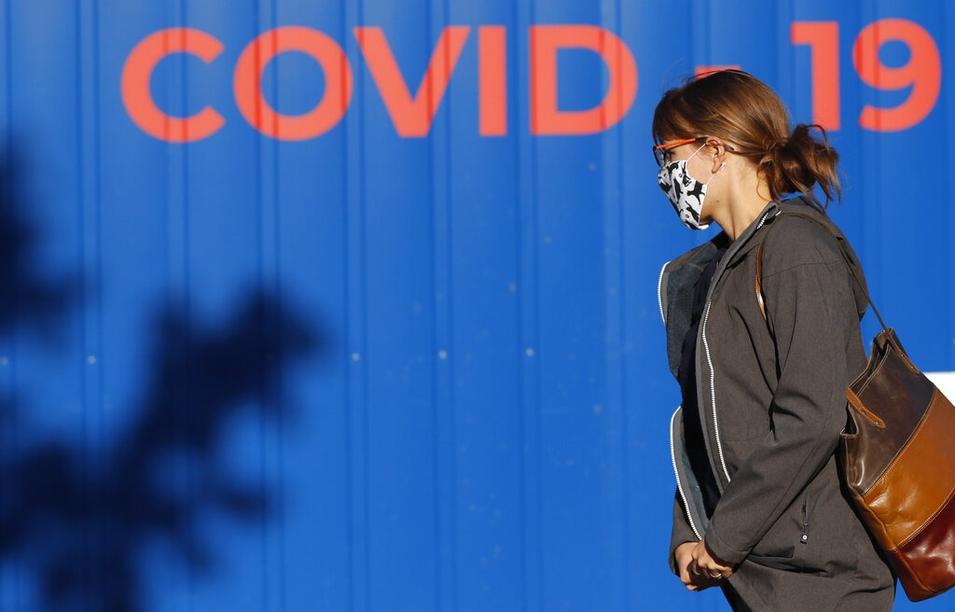 A woman wearing a face mask walks to get tested for COVID-19 at a sampling station in Prague, Czech Republic, Sept 18, 2020. (PETR DAVID JOSEK / AP)
A woman wearing a face mask walks to get tested for COVID-19 at a sampling station in Prague, Czech Republic, Sept 18, 2020. (PETR DAVID JOSEK / AP)
Africa tally
The number of confirmed COVID-19 cases recorded across the African continent has reached 1,373,986 while deaths rose to 33,251, the Africa Centers for Disease Control and Prevention (Africa CDC) said on Thursday.
WHO vaccine plan
France will provide funding for an initiative led by the World Health Organization (WHO) to buy potential COVID-19 vaccines, but will not source shots through the program, an official at the French health ministry said on Thursday.
Instead of tapping the WHO's global vaccine project, known as COVAX, Paris will secure shots through a joint scheme arranged through the European Union (EU), the official told Reuters.
A French official said the country will not source shots through the COVAX program while Brazil and several other Latin American countries have informed the WHO they need more time to sign up the program
Meanwhile, Brazil and several other Latin American countries have informed the WHO they need more time to sign up the program, officials said on Thursday.
Countries have until midnight on Friday to formalize legally binding commitments to COVAX, a mechanism for pooled procurement and equitable distribution of eventual vaccines.
Brazil said more time was needed to gather information on regulatory, legal, storage and logistical issues, while health officials in Mexico said their country would sign the commitment on time before the deadline.
Jarbas Barbosa, assistant director of the Pan-American Health Organization, said in a briefing on Wednesday that all countries in the Americas except the US had expressed interest in the vaccine facility as it gives them an added guarantee of access to doses.
Colombian President Ivan Duque confirmed on Wednesday that his government was joining COVAX and Paraguay's health ministry said it has already signed, even as it plans to buy the vaccine developed by AstraZeneca PLC and Oxford University.
WHO Europe
As COVID-19 infection rates soar in the European region, the World Health Organization (WHO) Regional Director for Europe Hans Kluge called for greater "regional coherence", respect for "scientific knowledge", and asked the authorities to embrace new disciplines in tackling "COVID-related fatigue in populations" at a virtual press conference on Thursday.
Weekly new cases of COVID-19 have now exceeded those reported when the pandemic first peaked in Europe in March, according to Kluge. The past two weeks have seen more than half of the countries in the region reporting a rise of greater than 10 percent in new cases, with seven countries experiencing their caseloads doubling, according to Kluge.
"Although these numbers reflect more comprehensive testing, they also show alarming rates of transmission across the Region," said Kluge.
According to the WHO, Europe currently accounts for 4,893,614 positive cases and 226,524 deaths.
READ MORE: Europe virus stars scramble after declaring victory too fast
AstraZeneca's halted trial
AstraZeneca Plc, the drugmaker working with the University of Oxford on a COVID-19 vaccine, contradicted a report that a volunteer in UK trials developed a rare nerve disease that might signal severe safety problems.
AstraZeneca was responding Thursday to a CNN report citing documents indicating that the diagnosis of the participant was confirmed as transverse myelitis. The diagnosis was “based on preliminary findings” and is inaccurate, the Cambridge, England-based drugmaker said in an emailed statement.
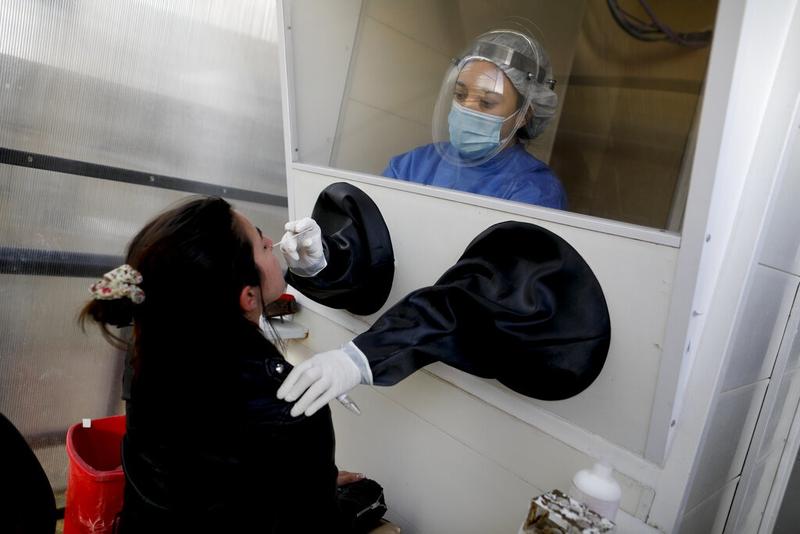 A healthcare worker conducts a nasal swab test from inside a freestanding coronavirus testing isolation booth, at the Posadas hospital, in Buenos Aires, Argentina, Sept 17, 2020. (NATACHA PISARENKO / AP)
A healthcare worker conducts a nasal swab test from inside a freestanding coronavirus testing isolation booth, at the Posadas hospital, in Buenos Aires, Argentina, Sept 17, 2020. (NATACHA PISARENKO / AP)
Argentina
Argentina reported 12,701 new COVID-19 cases and 232 deaths Thursday, according to the government.
Total COVID-19 cases now stand at 601,713, including 12,460 fatalities.
Brazil
The daily increase in new COVID-19 cases and deaths are slowing in all regions of Brazil, according to the country's Health Ministry.
Brazil on Thursday registered 36,303 new COVID-19 cases 829 more deaths, bringing the tally to 4,455,386 and the death toll to 134,106.
Canada
Canada could lose its ability to manage the coronavirus pandemic due to a worrying recent spike in new COVID-19 cases, the country's top medical officer said on Thursday.
An average of 779 new cases had been reported daily during the most recent week, more than double the level in July, Chief Public Health Officer Theresa Tam said. Officials in major provinces blame social gatherings for the spike.
Hours earlier, a source in Ontario, the most populous of the 10 provinces, said the government was considering strict new limits on social gatherings in three hot spots. A draft plan would reduce the size of indoor gatherings to 10, down from 50, and outdoor gatherings to 25 from 100, the source said.
The number of COVID-19 cases in Canada rose to 140,539 on Thursday, with 9,199 deaths, according to CTV.
Costa Rica
Costa Rica has registered a total of 60,818 confirmed cases of the novel coronavirus, after the Ministry of Health reported Thursday 1,302 new cases.
Another newly reported 17 deaths raised the death toll to 666, the ministry said. A total of 22,662 patients had recovered from the disease.
According to official data, Costa Rica registered 31,734 new infections last month, a figure that is higher than the 29,084 cases that had been added from March 6 to Aug 17.
Czech Republic
The city of Prague ordered its universities to close for in-person learning after the Czech Republic reported a record jump in new coronavirus cases.
Starting next week, higher-education classes will move online in the city of 1.3 million people, Prague Mayor Zdenek Hrib said on Twitter Friday. He said he had also wanted to close high-schools, but public-health officials rejected his proposal.
The republic's new COVID-19 infections accelerated as it reported more than 3,000 cases in a single day for the first time on Friday, a day after the daily tally first exceeded 2,000.
The country of 10.7 million has seen one of the biggest spikes in new coronavirus infections in Europe, with daily case numbers topping 1,000 for the first time in September.
According to Health Ministry data released on Friday, the country detected 3,130 new cases on Thursday, up from 2,137 the day before. In total, the country has recorded 44,155 cases.
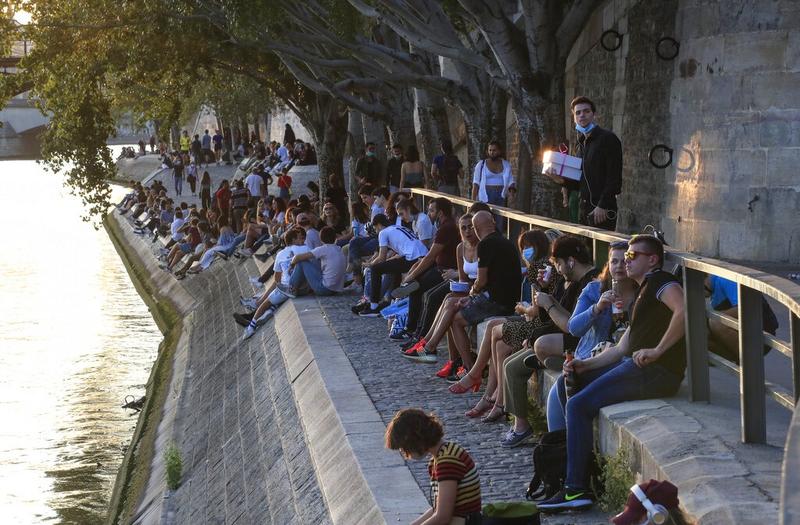 People gather along the Seine river bank during sunset in Paris, France, Sept 17, 2020. (MICHEL EULER / AP)
People gather along the Seine river bank during sunset in Paris, France, Sept 17, 2020. (MICHEL EULER / AP)
Denmark
Denmark is introducing a nationwide limit of 50 people on public gatherings and early closing times for bars and restaurants amid a record rise in Covid-19 cases.
From Saturday and until Oct. 4, businesses will be encouraged to let their employees work from home wherever possible. Citizens will be asked to limit their social circles, wear face masks in bars and restaurants and avoid public transport during rush hour, Prime Minister Mette Frederiksen said at a press conference in Copenhagen.
France
The city of Nice on the French Riviera will ban gatherings of more than 10 people in public spaces as it seeks to curb COVID-19 infections that are soaring in the region, local authorities said on Friday.
Bernard Gonzalez, prefect for the Alpes-Maritimes region, told a news conference that bars will be shut from 12:30 am to 6:00 am local time and the sale of take-away alcohol prohibited after 8:00 pm. Authorities are also lowering the ceiling for attendance at big public events to 1,000 people from 5,000 previously.
Working from home remains highly recommended, Employment minister Elisabeth Borne said earlier on Friday, as President Emmanuel Macron's government battles to contain a likely second wave.
France’s daily coronavirus cases rose by more than 10,000 on Thursday to the highest since the end of lockdown in May and Health Minister Olivier Veran warned that the virus “is again very active” in the country.
READ MORE: France eyes lockdown as last resort in Europe’s virus fight
France registered a record 10,593 newly confirmed coronavirus in the past 24 hours, health ministry data showed on Thursday. The ministry reported that the cumulative number of cases had risen to 415,481, and the death toll had risen by 50 to 31,095, the second-highest daily toll in two months.
Germany
Germany recorded more than 2,000 daily coronavirus cases for the first time since late April, according to data from Johns Hopkins University.
There were 2,179 new infections in the 24 hours through Friday morning, up from 1,855 a day earlier and the most since April 24.
According to data from the Robert Koch Institute (RKI) for infectious diseases, the number of confirmed cases increased by 1,916 to 267,773 while deaths rose by seven to 9,378.
Hungary
Hungary's government will decide on Saturday whether to extend a moratorium on loan repayments for companies and households that is due to expire at the end of this year, Prime Minister Viktor Orban told state radio on Friday.
Hungary's central bank has said about a third of the 60,000 Hungarian companies who had taken up the moratorium could face problems if it is lifted, while 10 percent of retail borrowers, or about 160,000 people, could face payment difficulties from next January without more help.
Hungary reported 710 new coronavirus cases on Thursday, bringing the total number of infections to 15,170, including 663 deaths.
Orban said on Friday that the daily tally of new infections was likely to jump above 1,000.
Ireland
Ireland reported 240 more coronavirus cases and one death ahead of an expected increase of restrictions in Dublin.
The Irish capital accounted for about half the newly diagnosed cases.
The government is expected to sign off Friday on boosting restrictions in Dublin to the next level, including keeping pubs that don’t serve food closed and tightening limits on travel outside the city.
Italy
The number of clinical trials of drugs for COVID-19 patients that are underway in Italy has expanded to 63, the National Health Institute (ISS) said on Thursday, as fresh data showed a stable pandemic trend in the country.
Overall, 92 percent of the 63 studies have a therapeutic purpose, and 8 percent a preventive purpose. Altogether, they involve 17,565 participants.
Some 45 of these clinical studies have been authorized by the Italian Medicines Agency (AIFA), of which the latest four had received the authorization on Sept 2, the ISS said in its update report.
The updates came as some 1,585 new coronavirus cases were registered in Italy on Thursday, bringing the tally to 293,025, according to the latest statistics released by the Health Ministry. Active infections increased by 881 to 41,413 while deaths rose by 13 to 35,658, data showed.
Kenya
Kenya has lost 16 healthcare workers to COVID-19 while 945 had been infected since mid-March when the first positive case was reported in the country, health officials said on Thursday.
Mercy Mwangangi, chief administrative secretary in the Ministry of Health, said the government has prioritized the provision of personal protective equipment (PPEs) to ensure that healthcare workers have a negligible chance of contracting the virus.
Kenya reported 183 new infections in the last 24 hours, pushing the tally to 36,576. Among the new cases are a seven-month-old infant and an 80-year-old elderly person.
Five more deaths were recorded, taking the death toll to 642.
Libya
The National Center for Disease Control of Libya on Thursday reported 886 new COVID-19 cases in the country, bringing the total confirmed number to 25,822.
Meanwhile, 410 more patients recovered from the disease while 11 died, raising the total number of recoveries and deaths to 13,908 and 409, respectively.
Mexico
Mexico's health ministry on Thursday reported 3,182 new confirmed cases of the novel coronavirus in the country, bringing the tally to 684,113 cases.
The ministry also reported 201 additional deaths, taking the death toll to 72,179.
Mexico will extend land travel restriction at its border with the US through Oct 21, the Foreign Affairs ministry said in tweet. The extension came after a review of the virus spread.
Morocco
Morocco on Thursday reported 2,488 new COVID-19 cases, raising the total number of infections in the country to 94,504.
The death toll rose by 28 to 1,714 while 260 patients are in intensive care units, the Ministry of Health said in a press release.
The number of recoveries increased by 1,962 to 74,930, the ministry said.
Namibia
The Namibian government said on Thursday it will open up the country for international travel from Sept 18 as it ends a six-month long state of emergency with the average number of daily coronavirus cases trending downwards.
Travelling in and out of restricted areas including the capital Windhoek and the surrounding towns of Okahandja and Rehoboth will be permitted as a countrywide curfew is lifted, President Hage Geingob said during a media briefing.
Contact sports will be allowed to resume, gambling houses and casinos can reopen and gatherings will be allowed up to either 50 percent of a venue's capacity or a maximum of 50 people, according to Attorney General Festus Mbandeka.
Meanwhile, Namibia's health minister said the Health Ministry has used 88 percent (US$40 million) of its budget for COVID-19 response.
Namibia recorded 114 new cases on Thursday , bringing the country's cumulative confirmed cases to 10,078, including 7,685 recoveries and 108 deaths.
Nigeria
The Nigerian government said on Thursday that the curve of the COVID-19 pandemic is beginning to flatten in the country.
"We cannot but say that tremendous progress has been made and that we are beginning to notice that the curve is flattening," Secretary to the Government of the Federation Boss Mustapha said at a daily press briefing of the Presidential Task Force (PTF) on COVID-19 in Abuja.
"However, as we have always stated, this positive development shall be taken with vigilance and cautious optimism," Mustapha said.
Nigeria has so far reported 56,735 confirmed cases and 1,093 deaths, according to a tally by Johns Hopkins University.
Russia
Russia has approved R-Pharm's Coronavir treatment for outpatients with mild to moderate COVID-19 infections and the antiviral drug could be rolled out to pharmacies in the country as soon as next week, the company said on Friday.
Coronavir's approval follows the green light for another Russian COVID-19 drug, Avifavir, in May. Both are based on favipiravir, which was developed in Japan and is widely used as the basis for viral treatments.
R-Pharm has started talks with pharmacies about orders, the company's spokeswoman said, with Coronavir supplies expected to be rolled out in the near future, possibly as soon as next week.
Russia reported 5,905 new coronavirus cases and 134 deaths on Friday, pushing its tally to 1,091,186 and the death toll to 19,195.
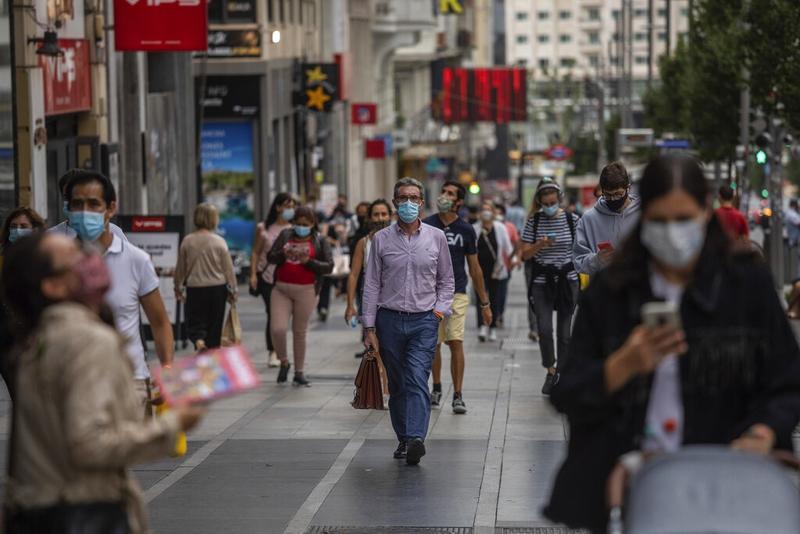 Pedestrians wearing face masks to prevent the spread of coronavirus walk in downtown Madrid, Spain, Sept 17, 2020. (BERNAT ARMANGUE / AP)
Pedestrians wearing face masks to prevent the spread of coronavirus walk in downtown Madrid, Spain, Sept 17, 2020. (BERNAT ARMANGUE / AP)
Spain
Spain reported 4,541 daily new cases, down from 4,728 a day earlier.
Deaths declined for the fourth straight day to 19, according to Health Ministry data. That compares to more than 800 on several days in March, when the pandemic first ravaged Europe.
Tunisia
Tunisian authorities on Thursday classified all the country's 24 provinces as red zones, the highest level of severity in terms of the spread of COVID-19, Tunis Afrique Presse (TAP) reported.
The announcement came as an average of more than 10 coronavirus infections per 100,000 inhabitants had been recorded in the 24 provinces, said the National Observatory of New and Emerging Diseases.
However in a statement carried by TAP, Mohamed Mokdad, director general of health structures at the Ministry of Health, said the situation was under control despite the spike in COVID-19 cases across the country.
COVID-19 "has proven that it has negative impacts on human health, global economy and culture, which forces us to coexist with it just as we previously lived with measles and smallpox," he was quoted as saying in the statement.
In total, Tunisia has reported 8,100 cases, including 129 deaths and 2,309 recoveries.
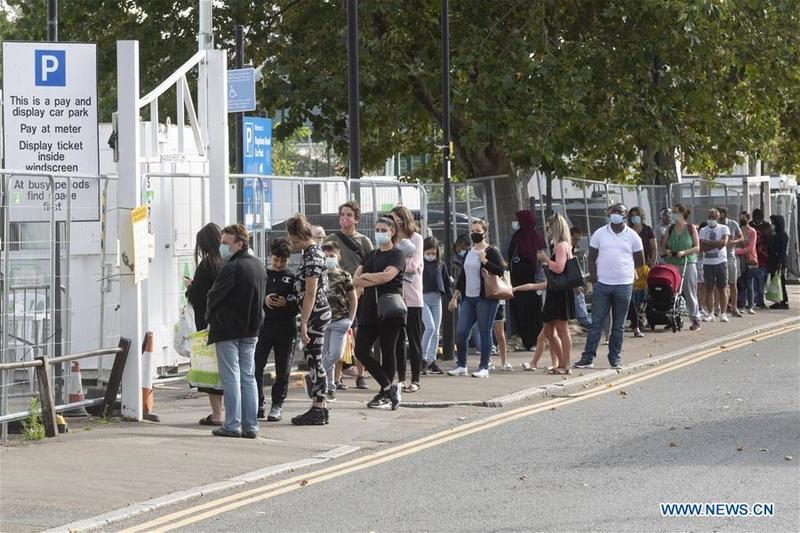 People line up to take coronavirus tests outside a designated center in London, Britain, on Sept 17, 2020. (RAY TANG / XINHUA)
People line up to take coronavirus tests outside a designated center in London, Britain, on Sept 17, 2020. (RAY TANG / XINHUA)
UK
Boris Johnson’s government extended coronavirus restrictions across northern England and the Midlands, as ministers refused to rule out a short national lockdown to tackle a surge in infections.
Residents in parts of northwest England, the Midlands and West Yorkshire face a raft of new measures including a ban on socializing with other people outside their own households, the Department of Health said on Friday.
The reproduction “R” number of COVID-19 infections in the United Kingdom has risen to a range of 1.1-1.4 from last week’s figure of 1.0-1.2, the government said on Friday, meaning that on average every 10 people infected will infect between 11 and 14 other people.
Scientific advisers told the British government earlier this month that just 6% of the United Kingdom’s population had antibodies to COVID-19, according to minutes of the meetings released on Friday.
Britain's health minister said on Friday that the novel coronavirus was accelerating across the country with hospital admissions doubling every eight days but refused to say whether or not another national lockdown would be imposed next month.
The UK's Test and Trace scheme said there had been a 167 percent increase in numbers testing positive in England since the end of August
There were 3,395 new cases on Thursday, bringing the tally to 381,614. Another 21 deaths were also reported on Thursday, taking the total to 41,705 deaths within 28 days of a positive test.
Matt Hancock said Thursday that from Friday, residents in Northumberland, North Tyneside, South Tyneside, Newcastle-upon-Tyne, Gateshead, Sunderland and County Durham should not socialize with other people outside their own households or support bubble, said Hancock. In addition, hospitality for food and drink will be restricted to table service only and late night restrictions of operating hours will be introduced in these places.
More than 10 million people are already in local lockdown and the London Evening Standard said figures due for release on Friday will show a sharp rise in COVID cases in London, putting Britain's capital at risk of restrictions on socializing over the next two weeks.
The national Test and Trace scheme said there had been a 167 percent increase in numbers testing positive in England since the end of August.
READ MORE: Virus spreading exponentially in UK for first time since March
A COVID-19 test known as DnaNudge that gives results in just over an hour and which requires no laboratory was accurate in almost all cases, according to an academic review in the Lancet.
Meanwhile, Transport Minister Grant Shapps said Thursday Slovenia and Guadaloupe have been added to the list of countries from which travelers must quarantine when entering England. However, he said travelers from Singapore and Thailand had been added to England's Travel Corridor list, meaning they would no longer have to enter quarantine on arrival.


